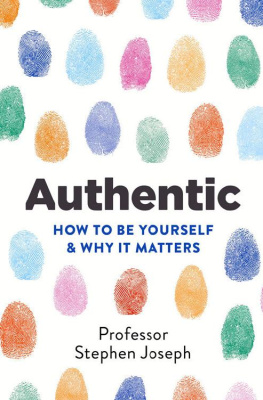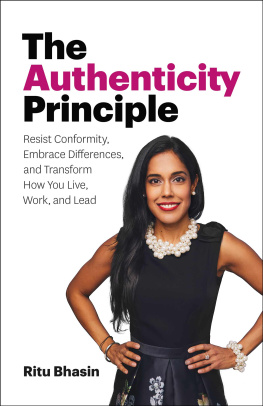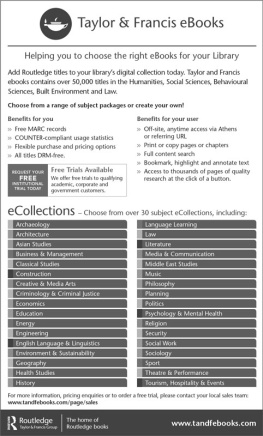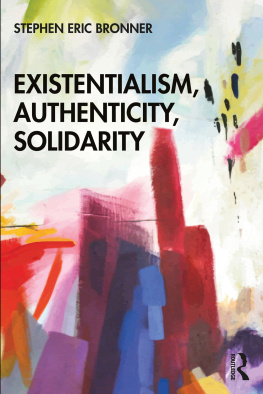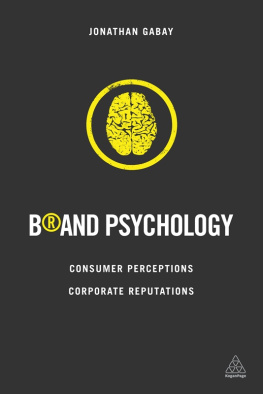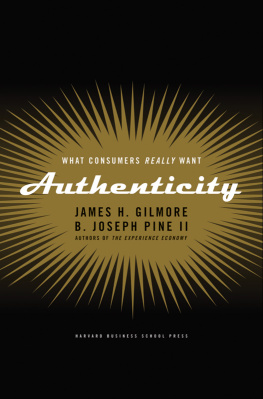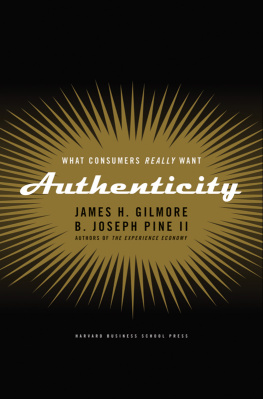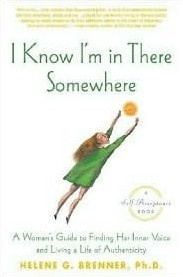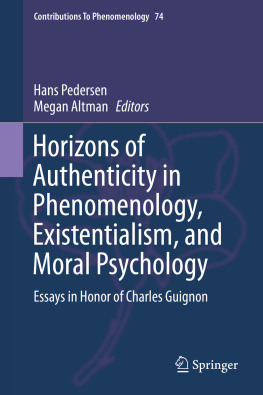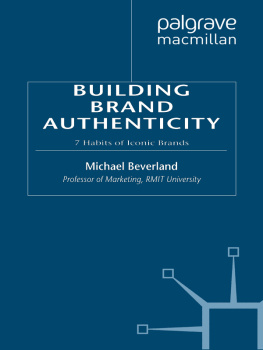At last, an inspiring book on the important topic of authenticity. Filled with case studies and great exercises, it will support you in your journey towards authenticity. I highly recommend the journey and this book as your map.
Dr Itai Ivtzan, Senior Lecturer Positive Psychology Programme Leader: MAPP, UEL, London
We were born like a great original and we should not live our life like a bad copy. This fascinating book by Stephen Joseph will help you to understand who you are and advise you on how to live an authentic life. This is a must-read for everybody who wants to live happy and successful life.
Jan Mhlfeit, Global Strategist Ret. Chairman Europe, Microsoft Corporation
This is a highly engaging book, in which Stephen Joseph demonstrates how being true to ourselves opens the door to flourishing in both a personal and professional sense. In a world where there is pressure to fit in and mask our true nature, its good to know that authenticity is so closely aligned with well-being and a meaningful life. The book makes a strong connection between humanistic psychology and present-day positive psychology and will be of particular interest to anyone who is in transition. Josephs message is ultimately a hopeful one that there is so much more to be gained when we embrace who we truly are. I found myself engrossed in the book its one of the best reads in a long time.
Miriam Akhtar MAPP, Positive Psychologist and author of Positive Psychology for Overcoming Depression and What is Post-traumatic Growth?
Too many people live their lives short of their full potential, ignoring that voice inside that tells them they could be happier, could achieve more, that they could be fulfilled. In Authentic, psychologist Stephen Joseph explains how everyone can discover their true self and transform their lives. Joseph combines the stories of real people with scientific research to create a clearly written and powerful tool that can help set readers on the path to a happier, more authentic life. A must-read for anyone who wants to heed the call of that voice inside but isnt sure how or where to start.
Jim Rendon, author of Upside: The New Science of Post-Traumatic Growth
Published by Piatkus
ISBN: 978-0-349-40485-1
Copyright 2016 Stephen Joseph
The moral right of the author has been asserted.
All rights reserved. No part of this publication may be reproduced, stored in a retrieval system, or transmitted, in any form or by any means, without the prior permission in writing of the publisher.
The publisher is not responsible for websites (or their content) that are not owned by the publisher.
Piatkus
Little, Brown Book Group
Carmelite House
50 Victoria Embankment
London EC4Y 0DZ
www.littlebrown.co.uk
www.hachette.co.uk
Psychologist Stephen Joseph, PhD, is interested in the study of human flourishing. Known internationally as a leading expert in positive psychology, he is the editor of the ground-breaking book Positive Psychology in Practice: Promoting human flourishing in work, health, education and everyday life.
He studied at the London School of Economics, before going on to gain his doctorate from Kings College London Institute of Psychiatry, Psychology and Neuroscience for his pioneering work in the field of psychological trauma. His previous book What Doesnt Kill Us: A guide to overcoming adversity and moving forward is available in translation across the world.
A coaching psychologist whose focus is on applying ideas from positive psychology, he helps people overcome challenges and find authentic, new directions in their personal and professional lives.
www.authenticityformula.com
In memory of Carl R. Rogers (19021987), who showed us that it is in good relationships that we are most able to be ourselves
Contents
Part III: Three Steps Towards Authenticity:
30 Practical Exercises to Try |
There are a number of scholars whose work has influenced me greatly, but I am particularly grateful for the work of Abraham Maslow and Carl Rogers. Sadly no longer with us, they are remembered for their important writings and research in humanistic psychology.
More recent scholars I am indebted to, who have provided new research insights, include Edward Deci, Veronika Huta, Tim Kasser, Kristin Neff, Richard Ryan and Ken Sheldon. My thanks to them and to the many others whose research I have mentioned throughout and in the notes at the end of the book.
My thanks also to Michael Baliousis, Alex Linley, John Maltby and Alex Wood, the original team who developed the Authenticity Scale with me. I am grateful for their collaborations. Without their expertise in data collection and statistical testing, the project could not have been developed as successfully as it did.
Writing this book has been a passion of mine, and I would like to thank my agent Peter Tallack who stuck with me throughout the initial proposal stages and helped me shape my vision for the book. Thanks also to my editor Anne Lawrance, at Little, Brown, for her encouragement, support, confidence in me, and for taking the book to the next stage. And thanks also to Jillian Stewart, my project editor at Little, Brown, who oversaw the final stages of production, and to Jan Cutler for her skilful and helpful copyediting.
Most of all I want to thank the many people whose stories I have told in this book, many of whom I have had the privilege to work with over the years as clients in counselling or coaching, but who remain anonymous, and also the hundreds of people who have taken part in my research studies over the years, and to the participants of the many other research projects mentioned in the book. It is only through the willingness of so many to take part in experiments, surveys and interviews that we know what we do.
My thanks to friends and colleagues who let me bounce ideas around and commented on earlier drafts of chapters. Thanks especially to Sian Clifford for her inspiration and encouragement. Others whose support has also been helpful are Saul Becker, Liz Blakey, Laura Blackie, David Browne, Lindsay Cooper, Mick Cooper, Zo Chouliara, Kate Hayes, Nicki Hitchcott, Rob Hooper, Chris Lewis, Lynne McCormack, David Murphy, Steve Regel, Christian van Nieuwerburgh and Pete Wilkins. Finally, my thanks to Vanessa Markey for her unwavering support, love and friendship over many years.
The
It was in the 1990s when I was studying to become a psychotherapist that I first encountered the notion of authenticity through the work of the late, great Carl Rogers. Rogers was one of the most influential psychotherapists and psychologists of the 20th century. For Rogers, authenticity meant being the author of ones own life. He saw this as a difficult process of always striving for balance in the process of realising ones own needs, while living together with others in such a way that meets the needs of those relationships. As such, authenticity required the person to understand themselves, to have awareness of their inner emotional states and to possess the ability to be openly expressive of these states with others. For Rogers, it was the ability of people to live in such a congruent way that made for the good life by which he meant living more purposefully and meaningfully, and seeking ever greater authenticity in each and every moment.
As a psychotherapist, Rogers believed that people seeking help were most often characterised by a lack of authenticity in their lives. In his view, experiences of distress were often an expression that one was out of balance, and a cry for help to become more authentic.
To help people live more authentic lives, Rogers developed a form of psychotherapy known as client-centred therapy. This was based on the idea that when people feel truly accepted for who they are, they dont feel the need to put on a faade. Instead of pretending to themselves and to others that they are something they are not, they start listening to their own inner voice of wisdom and begin to make more authentic decisions about how to lead their lives. As they become more authentic in themselves and with other people, their lives take on new direction, meaning and purpose.

